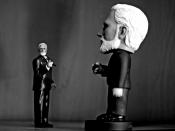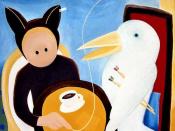In his book the Interpretation of Dreams, Freud draws the conclusion that dreams are personal psychological events. Freud called dream interpretation the "via-reggia," or the "royal road" to the unconscious,
We dream every single night whether it stays with us or not. When we dream we entertain a wider range of human possibilities then when we are awake. It has been suggested on more than one occasion that we in fact have no knowledge of the dreams that we set out to remember, actually occurred. What we have remembered of a dream has been told to us by our brain, which seems incapable of remembering a whole dream and may have lost precisely the most important parts of its content. Often we regret the fact that we can not remember anything of our dream except a single part. Which itself is unclear. Secondly, there is every reason to suspect that our memory of dreams is not only short but wrong and fake.
On the other hand it may be doubted whether what we dreamed was really as hazy as our memory of it. It also may be doubted that in our attempt to remember a dream we do not fill in what we never actually dreamt (Freud, pg. 512). Dream accounts are public verbalizations and as public performances, dream accounts resemble the anecdotes people use to give meaning to their experience, to entertain friends and give or get a form of satisfaction. In order to talk about the memory of a dream there are at least three steps one must take. First putting a remembered dream into words requires labeling categories and labeling categories involves interpretation. Next since the dream is multimodal, putting them into words requires the collapsing of visual and auditory imagery being put into...


